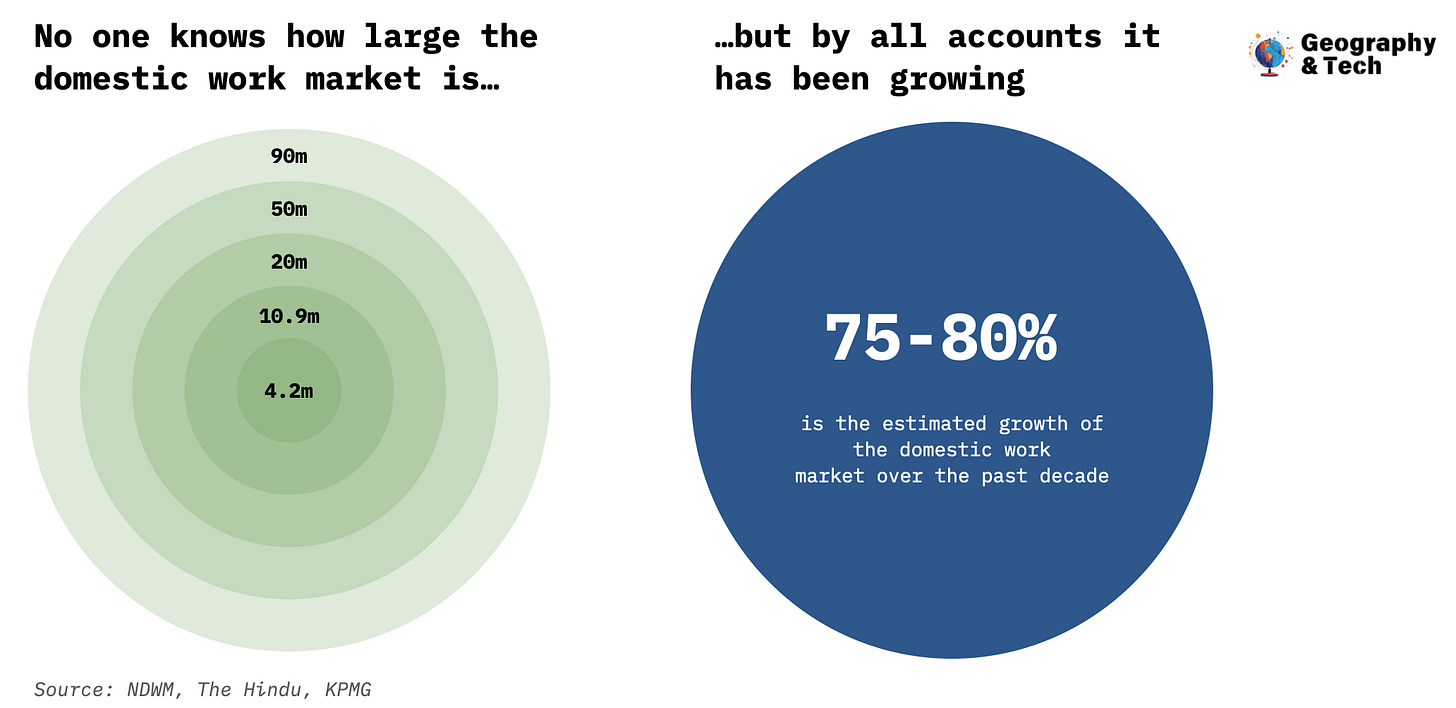Hello dear reader,
It’s Tuesday, and today we’re discussing an Indian on-demand services app, Snabbit, which secured $5.5 million in Series A funding. Elevation Capital was the lead investor in the round with Nexus Venture Partners and several angel investors also participating.
The Product
Through Snabbit’s app, users can book household helpers for services like kitchen cleaning, window cleaning, laundry, and kitchen prep.
After downloading the app, users select the service they need, along with the arrival time and duration. When the worker arrives, the customer shares a one-time password, and the task begins.
A few peculiar things stand out about how the app works.
First, you can either schedule a specific time for help to arrive or have someone show up in just 15 minutes—which sounds insane.
Second, you pick the service duration. Let’s say I have a two-bedroom apartment and want a weekly cleaning service that includes window cleaning. If I book just one hour, that’s obviously not enough. If it takes me two hours to clean everything myself but Snabbit’s worker needs three hours, I’ll have to renew the service. That’s not ideal—I wouldn’t be thrilled about paying extra.
On the other hand, charging per service isn’t easy either. Even if you know the apartment’s size, you can’t predict how dirty it is or how much stuff needs to be cleaned. So, there are trade-offs no matter how you approach pricing..
The Business Model
I may be wrong, but it feels like most household help services operate as aggregators—middlemen connecting customers with independent workers. Not Snabbit. The company runs a full-stack model, handling everything from hiring and training to managing and deploying the workforce.
Since task duration is fixed, pricing is also fixed—customers are charged by the hour. According to Snabbit’s website and app store listings, one hour of help costs $2, which sounds incredibly low (but isn’t, as we’ll soon discuss).
And because Snabbit promises 15-minute arrivals, its service area is limited. Right now, the app operates in several clusters of Mumbai, serving 6,000 families. With further expansion, Snabbit plans to add more household services and expand into new areas.
The Local Angle
Domestic Work is Widespread (Probably): Due to a lack of regulation, no one really knows how many domestic workers exist in India. Estimates range from 4.2 million to 90 million, with numbers like 10.9 million, 20 million, and 50 million thrown around. The 4.2 million and 90 million figures have been cited for 20 years, so something must have changed. The Women in Informal Employment: Globalizing and Organizing (WEIGO) and the International Labour Organization (ILO) estimate that 75.6 million domestic workers exist globally, with 9.3 million in South Asia. If we assume domestic work is proportional to population, that would put India at 6.7 million—which doesn’t sound like much, but demand is highly concentrated in cities. One survey found that 54% of Bengaluru households and 32% of Chennai households hire domestic workers.
Domestic Work is Growing (Probably): The 10.9 million estimate comes from KPMG in India, which I’d like to trust. They report an 81% increase in domestic workers over the past decade, with some sources citing 75% growth. India’s urban population has risen 7 percentage points in 20 years and continues growing by 2% annually. Household incomes are also rising by $50–100 per year. In short, domestic help is riding strong tailwinds.
Solving for Trust for Everyone: The industry faces trust issues on both sides. For consumers, it’s hard to find reliable domestic help. In most of the region, less than 20% of domestic workers are hired through service providers. For workers, the challenges are even greater. Domestic workers in India earn as little as $70 per month, even in major cities. 25% of domestic workers are estimated to be under 14 years old. The industry is unregulated, meaning workers have little to no protection. And all of this is amplified by India being a low-trust society. Snabbit helps both sides. For consumers, it guarantees a certain service quality. For workers, it offers a minimum income level and, presumably, some worker protections.
The Roadblocks
Supply-Side Challenges: Unlike quick commerce, this service requires significantly more training. Workers need more than just timely arrivals—they must be polite and deliver quality service. That adds a layer of training, slowing down expansion. There are also workforce challenges: workers can be poached by families for exclusive employment, service quality varies between individuals, and the nature of the job increases the risk of conflicts between workers and customers.
Demand-Side Challenges: A full-time maid costs between $70 and $150 per month, while an hour of Snabbit costs $2—equivalent to $320 for full-time work. The counterargument is that these are different use cases: full-time help vs. occasional domestic assistance. But given the lack of supply constraints, workers have little leverage over their pay. Whether they work full-time or sporadically, their hourly rate doesn’t change much. Another challenge is managing demand fluctuations, especially since Snabbit guarantees a minimum income. If demand surges, some customers might be frustrated by unavailability. If demand drops, Snabbit’s unit economics take a hit.
The Takeaway
I’m in awe of two things.
First, the 15-minute delivery thing still puzzles me. Second, I understand that prices differ between countries, but for $2 per hour of work not to be considered ridiculously low is crazy.
As for Snabbit, it feels like a great idea for a proven market with a proven business model. The question is, will this model work in this market?









